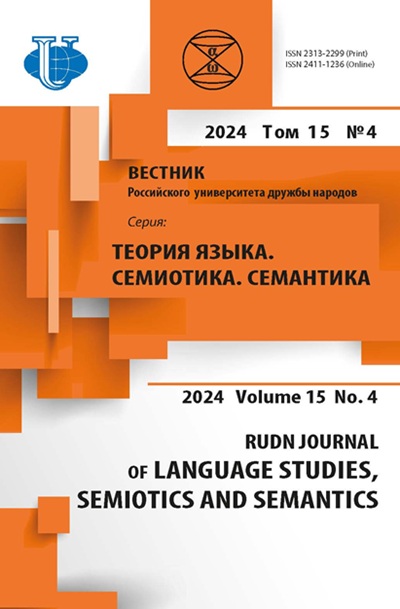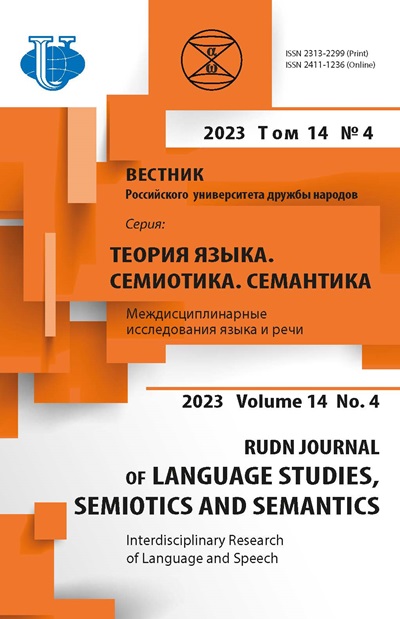The Modelling of a Multidimensional Linguocultural Concept on the Example of the Concept СТАРОСТЬ ‘SENILITY’
- Authors: Safaralieva L.A.1, Perfilieva N.V.1
-
Affiliations:
- RUDN University
- Issue: Vol 14, No 4 (2023): INTERDISCIPLINARY RESEARCH OF LANGUAGE AND SPEECH
- Pages: 1217-1234
- Section: SEMIOTICS. SEMANTICS. PAREMIOLOGY
- URL: https://journals.rudn.ru/semiotics-semantics/article/view/37661
- DOI: https://doi.org/10.22363/2313-2299-2023-14-4-1217-1234
- EDN: https://elibrary.ru/BEOICO
Cite item
Full Text
Abstract
The novelty of the study is due to the modelling of a linguocultural concept, while its structure properly represents a multilevel model determined by its essential, obligatory components, such as meaning, notion, value and imagery components, as well as by the set of their potential associates. The study synthesizes modern ideas and views already developed in the Russian linguistics concerning a concept as a mental formation. There are generalized theoretical and applied approaches to the definition of mental formations or concepts, in particular, both linguocultural and linguocognitive formation aspects of a concept are discussed in detail. The complexity of elaborating a simple, unambiguous definition and formulating value and imagery conceptual components represents the subject of the study. On the basis of the Russian language material, the model of the concept СТАРОСТЬ (‘SENILITY’) is put forward, the concept’s structure is particularly characterized, as well as the principles of selecting lexical, paremiologiсal and phraseological units which form the concept’s lexical frame. The elaborate algorithm to structure the concept consists of a number of stages: the defining of a semantically and stylistically neutral concept’s verbalization, the reconstructing of the notional component, the selecting of lexical units to express its value and imagery components. The issue of the differentiation and delimitation of value and imagery components is studied separately as both of them possess different and common reconstruction sources, e.g., phraseological and associative dictionaries. The model of the multidimensional linguocultural Russian concept СТАРОСТЬ ‘SENILITY’ as the pattern to construct similar models of other concepts, produces the main result of the given study. The reconstruction of multilevel models of concept is in prospect and would allow present the fragment of the worldview of the Russian linguoculture bearers.
About the authors
Lyubov A. Safaralieva
RUDN University
Author for correspondence.
Email: kuznetsova-la@rudn.ru
ORCID iD: 0000-0002-6960-9426
PhD in Philology, Associate Professor of the Department of General and Russian Linguistics, Faculty of Philology
6, Miklukho-Maklaya st., Moscow, Russian Federation, 117198Natalia V. Perfilieva
RUDN University
Email: perfilyeva_nv@pfur.ru
ORCID iD: 0000-0002-1018-809X
PhD in Philology, Associate Professor, Associate Professor of the Department of General and Russian Linguistics, Faculty of Philology
6, Miklukho-Maklaya st., Moscow, Russian Federation, 117198References
- Demyankov, V.Z. (2007). The term “concept” as an element of terminological culture. In: Language as the matter of meaning: A collection of articles in honor of Academician N.Y. Shvedova. M.V. Lyapon (Ed.). Moscow: Azbukovnik Publ. pp. 606–622. (In Russ.).
- Maslova, V.A. (2019). The word as a value of Russian linguocultures. In: Science — education, production, economy: Proceedings of the XXIV (71) Regional Scientific and Practical Conference of teachers, researchers and postgraduates, Vitebsk, February 14, 2019. Vitebsk: P.M. Masherov Vitebsk State University Publ. pp. 123–124. (In Russ.).
- Slyshkin, G.G. (2000). Linguistic and cultural concepts of precedent texts. Moscow: Academia. (In Russ.).
- Slyshkin, G.G. (2004). Associative model of a linguocultural concept. Spec. vol. «Actual problems of the humanities», 1, 158–163. (In Russ.).
- Slyshkin, G.G. (2004). Linguocultural concept as a system education. Proceedings of Voronezh State University. Series: Linguistics and Intercultural Communication, 1, 29–34. (In Russ.).
- Karasik, V.I. (2002). Language circle: Personality, concepts, discourse. Volgograd: Peremena Publ. (In Russ.).
- Karasik, V.I. (2005). Categorical evaluative concept of «authenticity». In: Conceptual spheres «world» and «man». Vol. 6. Kemerovo: Grafika Publ. pp. 3–14. (In Russ.).
- Karasik, V.I. (2007). Linguistic and cultural type. In: Language. Text. Discourse. Scientific Almanac. Vol. 5. Stavropol-Pyatigorsk. pp. 86–89. (In Russ.).
- Karasik, V.I. (2010). Linguistic crystallization of meaning. Volgograd: Paradigma Publ. (In Russ.).
- Karasik, V.I. (2022). Generosity as a value of Russian linguocultures. In: General and Russian Linguoaxiology: A collective monograph. Yaroslavl: Kantsler Publ. (In Russ.).
- Vorkachev, S.G. (2001). Linguoculturology, linguistic personality, concept: the formation of an anthropocentric paradigm in linguistics. Philological Sciences, 1, 64–72. (In Russ.).
- Vorkachev, S.G. (2016). EX PLURIBUM UNUM: Linguocultural concept as an integral entity. Russian Journal of Linguistics, 20 (2), 17—30. (In Russ.).
- Prokhorov, Yu.E. (2009). In search of a concept. Moscow: Flinta Publ. (In Russ.).
- Vorobyev, V.V. (2021). Cultural linguistics and intercultural communication in foreign language teaching. Actual problems of linguistics and intercultural communication: Proceedings of the international scientific and practical conference, Moscow, the 28 of November of 2020. Vol. 5 (9). pp. 137–143. Moscow: Kosygin Russian State University (Technologies. Design. Art) Publ. (In Russ.).
- Shaklein, V.M. (2019). About problems in modern linguoculturology. Russian word in the multilingual world : Proceedings of the XIV Congress of MAPRYAL, Nur-Sultan, Kazakhstan, April, 2019. Nur-Sultan, Kazakhstan: MAPRYAL Publ. pp. 569–574. (In Russ.).
- Shaklein, V.M., Rubakova, I.I., & Mikova, S.S. (2021). Folklore concepts of «Space» and «Time» in the Russian chastushka. Moscow: Znanie-M Publ. https://doi.org/10.38006/00187044-9.2021.1.144 (In Russ.).
- Boldyrev, N.N. (2001). Cognitive semantics: A course of lectures on English philology. Tambov: Tambov University Publ. (In Russ.).
- Boldyrev, N.N. (2001). The concept and meaning of the word. In: Methodological problems of cognitive linguistics. Voronezh. pp 25–36. (In Russ.).
- Boldyrev, N.N. (2004). The conceptual space of cognitive linguistic. Issues of Cognitive Linguistics, 1, 18–36. (In Russ.).
- Boldyrev, N.N. (2007). Representation of knowledge in the language system. Issues of Cognitive Linguistics, 4(13), 17–27. (In Russ.).
- Boldyrev, N.N. (2015). The anthropocentric essence of language in its functions, units and categories. Issues of Cognitive Linguistics, 1(042), 5—12. (In Russ.).
- Popova, Z.D., & Sternin, I.A. (2001). Essays on cognitive linguistics. Voronezh: Istoki Publ. (In Russ.).
- Popova, Z.D., & Sternin, I.A. (2007). Semantic and cognitive analysis of language. Voronezh: Istoki Publ. (In Russ.).
- Karaulov, Yu.N. (1999). Active grammar and associative-verbal network. Moscow: IRYA RAN Publ. (In Russ.).
- Krasina, E.A., Perfilyeva, N.V., Maslova, V.A., & Lavitskiy A.A. (2020). Directions and methods of linguistic research: a textbook for students of higher educational institutions. Minsk: RIVSH Publ. (In Russ.).
- Safaralieva, L.A. (2021). Evolution of the Associative/Verbal Network of the Concept “Old Age” in the Language Consciousness of the Native Russian/Language Speakers of the 20s of the XXI Century. RUDN Journal of Language Studies, Semiotics and Semantics, 12(4), 1147—1159. https://doi.org/10.22363/2313-2299-2021-12-4-11471159 (In Russ.).
Supplementary files
There are no supplementary files to display.













